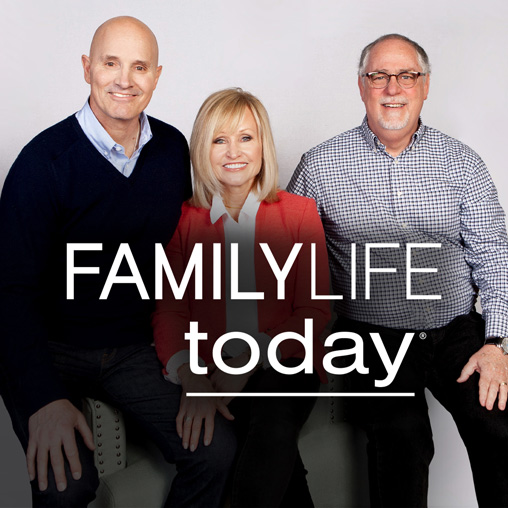
What About Single Women?
Abigail Dodds teaches on the beauty of God's good design regarding gender. Women, Dodds explains, are absolutely just as fearless as men, but their physical reality naturally makes them nurturers. If women are created to bear life, then what about single women? Though singles are excluded from childbearing, they aren't excluded from anything essential to God's kingdom. Hear how single women can be nurturers and life-givers in their homes and communities.
Show Notes
About the Guest
-
- Find resources from this podcast at https://shop.familylife.com/Products.aspx?categoryid=130.
- Download FamilyLife's new app! https://www.familylife.com/app/
- Check out all that's available on the FamilyLife Podcast Network. https://www.familylife.com/familylife-podcast-network/
-

Abigail Dodds
Abigail Dodds (BA, Bethel University) is a wife and mother of five children. She writes and teaches Bible studies for the women at Bethlehem Baptist Church, where her husband, Tom, serves as an elder. She contributes to desiringGod.org and blogs at her personal site, hopeandstay.com.
Abigail Dodds teaches on the beauty of God’s good design regarding gender. Hear how single women can be nurturers and life givers in their homes and communities.
What About Single Women?
Bob: This is FamilyLife Today for Wednesday, May 19th. Our hosts are Dave and Ann Wilson; I’m Bob Lepine. You can find us online at FamilyLifeToday.com. There is a right kind of empowerment and a wrong kind of empowerment for both men and women. We need to make sure we’re focused on the right kind of empowerment. We’re going to talk more about that today. Stay with us.
And welcome to FamilyLife Today. Thanks for joining us. What did you just say? [Laughter] What did you just say?
Ann: I just said, “This is going to get some backlash.”
Bob: And what did you say?
Abigail: I said, “Oh, I’m getting used to it.” [Laughter]
Bob: Okay; the person who is getting used to backlash is Abigail Dodds, who joins us again on FamilyLife Today. The woman, who says, “This is going to get some backlash,”—Ann Wilson. Why? Why?
Dave: Yes; why, honey? Why do you say that?
Bob: Why do you think this will get backlash?
Ann: Because some women are going to be really angry about this—
Bob: Yes.
Ann: —these episodes—of saying: “I totally disagree. Women are just as strong/just as a fearless as men,”—and so yes, there are going to be some people that don’t like this.
Bob: —or don’t like your book, which is called (A)Typical Woman: Free, Whole, and Called In Christ.
The thing I love is that Abigail has taken on the courageous task of saying, “Okay; let’s look at how the Bible helps us understand that womanhood and manhood/that gender is God’s good design and is to be celebrated and embraced rather than rebelled against and done away with.”
That’s been what we’ve been trying to explore because, as we’ve said this week, Abigail, to try to get to a cohesive definition of femininity is a daunting challenge. There are words I have heard used: “So a woman is life-giving,”—you’ve heard that expression; right?
Abigail: Yes.
Bob: In a biological sense, women can give birth. Men can be life-giving to other men; right? When we say life-giving is a quality of womanhood, but men can still do it. Help us understand that distinction. Isn’t everything—men are courageous—well, aren’t women courageous? Women are tender; well, shouldn’t men be tender?
Abigail: Right.
Bob: How do we deal with all of this stuff?
Abigail: Right?! Well, that is what makes it all so difficult is—and even just what you said, Ann, at the beginning—about women feeling offended because they think they also are just as strong and fearless. I’m thinking, “They are just as fearless.”
Ann: I was going to say—yes.
Abigail: And yet, I do think that the physical reality gives an essence or a shape to even the spiritual reality or the nurturing reality. It’s not so much that we don’t have certain qualities and we do have others and men don’t have certain qualities and they do have others in the spiritual realm—let’s say—but there is a matter of emphasis that happens. As someone who hasn’t often thought of myself as particularly typical, becoming a mother did show me that I was, maybe, a bit more typical than I had thought.
For instance, I learned that my husband really does take a lot more risks than I do. Even though, going into being a parent, I thought of myself as pretty laidback/pretty open to risk. In some ways, I am more than other women; but when it comes to me next to my husband, I’m not!—I’m not—I’m the one who is like, “Oh, let’s slow down.”
Ann: Or it becomes—I realized that, too—like/I felt like: “I’m a risk taker. I’m an adventurer. I will take any risk that Dave will have”; but then you put my kids with Dave—
Abigail: Right; it changes.
Ann: —and suddenly—
Dave: She said, “My kids.” Did you notice that? [Laughter] They are my kids, too!
Abigail: I know how that works. [Laughter]
Ann: But suddenly, I thought, “I am not a risk-taker with my children/with our children”; but Dave was. That’s where I thought that, too—like: “Whoa.
Abigail: Right.
Ann: “I guess I don’t have quite as much.”
Abigail: I can see some more innate differences coming out; and it’s like, “Oh, some of these stereotypes make a little more sense to me now.”
Dave: So what’s going on in our culture, where nobody wants to address that? I mean, you know, I’ve been preaching for 29 years. Ten/fifteen years ago, I could stand on stage and say: “Men and women are different.
Abigail: Right.
Dave: “Here is how…” People laughed; they enjoyed it. Now, you say that; and there’s like: “Oooh! They are not different. We’re really similar.” Tell us what’s happening.
Abigail: Well, when you’ve completely deconstructed biological sex, then saying what you just said isn’t just a small thing to say; it’s a gigantic leap because the general hive mind of our culture/the general mindset is so, so far down the road from that. It really is a deconstructing of everything/it’s: “We’re self-makers,”—we say what we are—“Full autonomy; we get to choose how this all works.”
Bob: You mentioned that, when you became a mom, all of a sudden, some of the innate woman-ness started to emerge. So often, when we talk about what it means to be a woman or what femininity is, we define it in comparison to men or in the context of marriage—how husbands and wives are different or moms and dads—we put it in that family structure.
I’m thinking: “What about the single woman? How does she understand her woman-ness as a standalone?” Certainly, there are other men in her world; and so, it’s not like we’re absent of that.
Ann: Can a woman be complete if she never marries or never has a child?
Bob: Yes; can she be fully a woman?
Abigail: Absolutely; yes—no equivocations—yes in every way. Because, while there is a reality that God has made the world in such a way—that marriage must exist for this to all go forward/children must be had—there’s such particular provision in the Scripture for the single people and the intense value that they bring to the body of Christ.
It’s like a very distilled dense value that they bring to us; because as Paul says, “They are able to be single-minded in their mission for the Lord.” The church desperately, desperately needs them—and not just as a babysitter—we need their minds. We need—yes—we need even their physical bodies to come and labor among us.
Ann: —their gifts/their spiritual gifts.
Abigail: Yes; we need their spiritual gifts to be enhancing in so many ways. For a single woman, I think Elisabeth Elliot probably said it the very best when she said that “Singleness is a gift, and we don’t choose our gifts.”
Bob: In the question of embracing your womanhood—certainly, you bring value, and you bring gifting, and you bring who you are to serve—but you’re not called to be a specific helpmeet to a man, you’re not called to be a biological life-giver and a nurturer to your child. If those are off the table for you, you can understand where a single woman would go: “It does feel like part of what it means to be a woman/I’m excluded from that. How do I process that?”
Abigail: Right. I don’t know that I’d deny that: “Yes; you are excluded from something but not from anything that is essential.” For some women, that might not be a grief; they might be very content in their singleness. For others, that might be a gigantic grief worth grieving over, and moving forward, recognizing that, again, those spiritual realities are still there in terms of what it means to be a woman.
Like I said—Elisabeth Elliot being a mother—or just because your body can’t nurture and grow life as a home doesn’t mean that you can’t nurture and grow life in the church, and in your home, or your apartment, or your dorm room, or wherever you are. Making a home can still be a massive priority with incredible kingdom impact in terms of hospitality, and ministering to the needs of the saints, and doing all the things that Paul even talks about when he’s giving qualifications for widows. He talks about how they washed the feet of the saints, and they’ve done these things well.
Well, you may not have children that you’ve raised; but there are great many things that you can still do in serving the Lord Christ and in sharing Him with everyone you meet.
Bob: Here is a question—this/I’ll be interested to see how you answer this—a woman, who is married, is to be a helpmeet to her husband. Should an unmarried woman seek to be a helper to the men in her world, or is that not a requirement for her? Is that not a part of her femininity, to look around and say: “Well, I’m a woman. I am here to try to be a helper to the men around me”? Some women will hear me say that and go: “No; I’m not here to be their helper. I’m their peer.”
Ann: That word—see, that word just grates at you—like, “Well, I don’t want to help him!” because I looked that up one time. As I was looking that up in the Hebrew, I thought, “I need to get a better definition; because I first looked it up in Webster’s Dictionary. That word—it said in the dictionary: “A go-for, a person that does the dirty work. Someone important tells them what to do.” Of course, any woman would grate at that word.
Bob: Yes.
Ann: However, what do you think, Abigail?—would a single woman—is that her place to help a man?
Abigail: I still think it is, but I want to be really careful with my qualifications; because what some people might hear when I say that is that, somehow, there is some sort of weird husband/wife thing going on, where all women are submitting to all men; and I don’t believe that one bit.
Bob: I don’t either, and neither do you guys.
Ann: Right.
Dave: Nope.
Ann: None of us do.
Dave: Nope.
Bob: Let’s just be really clear. It is not the responsibility of women, in general, to submit to men in general. When the Bible talks about it, husbands and wives, yes; men and women, no.
Abigail: Right; exactly.
Bob: Okay.
Abigail: With that very clear, I feel very comfortable; thank you.
I would just say, “Yes, I still do think there would be a disposition to help.” I don’t think that’s degrading, and I don’t even think that that means she can’t be a leader in certain ways or in many ways even; but that’s a God-glorifying disposition. Who wouldn’t want to do that? Like I said, rightly-oriented about God, understanding Him as a loving Father, who made His creation and called it “very good,” then I think it’s a good thing, then, to want to be an easer/a helper.
Bob: We were out at dinner the other night—Mary Ann and me—we were at one of these restaurants that has TV/flat-paneled TV’s going on. There were sports on the TV. There were two women, who were—I don’t know if they were cage fighting or boxing—but they were going at each other. Mary Ann looked at me and she said, “Is that something you’re interested in watching?” [Laughter] I thought, “This is a—
Dave: Bob, what was your answer? I want to hear this!
Bob: —I thought, “This is a trick question.” [Laughter] I understood the bigger question at play in terms of things that we think of in traditionally male categories. We don’t typically think of a four-year-old and a two-year-old daughter in the living room, wrestling with each other.
Abigail: Right.
Bob: That might happen; somebody is going to write me and say, “That happens all the time.”
Ann: Yes; I did that with my brother; yes.
Bob: Okay; that’s right; but if it had been you and a sister, would that have happened?—or were you doing it with your brother because your brother was looking for another guy to play with? —and you were the closest thing around and—
Ann: Probably.
Bob: —he just/and you were happy to join in because you wanted to be one of the guys.
Ann: Yes.
Bob: Right.
Ann: And my sister was very feminine. I would have probably liked to do that with her because I would have beat her; but you’re—[Laughter]—yes, that’s a great question.
Bob: So in the midst of these kind of general categories, if a woman/a young woman, who is growing up, goes: “I want to be the kicker on the football team.”
Ann: Let’s take it to Abigail. Would you let your daughter be the kicker on a football team?
Bob: If she said, “That’s what I want to be, Mom;—
Ann: Yes, and she’s good at it; and she’s a great soccer player.
Bob: —“I’m really good.”
Abigail: I would say: “Aim higher, daughter. Let’s get a new dream.”
Ann: Really?
Abigail: I mean, “Aim higher,” in the sense of: “This doesn’t need to be your ambition.”
Ann: —“or identity”?
Abigail: Right; I mean, there is nothing wrong with kicking a ball. Don’t hear me say that, because that’s silly legalism; but to be on an all-male sports team is a whole other thing—to put yourself in a position, where you could potentially be tackled by men. First of all, we’re training our men, then: ”That it’s okay to tackle women.” That’s just not okay. If my son were on the team, I would hope he would say: “I’m sorry. I’m not playing, because I won’t do that.” To have a daughter, who would want to put herself in that position, I would just say, “You were made for more, dear.”
Ann: I think I would ask, “Tell me about that.
Abigail: Absolutely.
Ann: “Tell me what you long for in that.”
Abigail: Absolutely; because there are other ways, then, of directing her.
Ann: Abigail, in the last part of your book, you talk about being fearless and free women in Christ. When I hear that, I think every woman longs for that. She wants to be fearless, but she also wants to be free.
What I’ve encountered, over the years, is women are not free. I think they are shackled by shame; they are shackled by comparison. There is a part of us that, as women, it’s hard for us to celebrate each other because of our own insecurities. What does it mean, as we finish up, to be free?
Abigail: Yes; I think you said it exactly right; that’s also what I’ve seen: is a huge amount of insecurity in women. Where all that comes from—of course, there are external forces that can play into that—but primarily, I think we need to say, “Insecurity comes from not trusting in Christ, who is our security.” The more we can get our footing in Him/the more we can identify, fully, and wholly in Christ, the more secure we will be; the more free we will definitely be; and the more freedom will be conceived of appropriately.
Sometimes, you use a word like free, and people think, “Oh, well, free—that just means I get to do whatever I want,”—but that is not the definition of freedom in the Scripture. When Christ sets us free, it’s so that we can be unshackled from the chains of sin and death. It is not freedom to be autonomous and go on sinning.
Bob: Yes.
Abigail: Defining it appropriately is so essential right now in our culture because we’ve completely misconstrued the idea of freedom. Unless we make sure we’re telling women—“This is what Jesus means by freedom: He wants you free from your sin. He wants you free to walk with Him toward holiness,”—then it will end up becoming a little mimic of what the world says/real self-empowering,”—where we don’t want to be self-empowered; we want to be empowered by the Holy Spirit of the Lord.
Dave: I love what you wrote—it was back in the chapter about single women—it was: “Jesus doesn’t complete the incomplete”; you know, like “Jesus will be the one to complete you,”—you say: “He utterly overcomes and swallows us up in Himself. We are made new and whole in Christ, not merely completed by Him.”
Ann: That’s really beautiful.
Dave: Beautiful truth of the redemption of Christ; right?
Bob: And I’m thinking about Galatians 5:1, as you’re talking, where Paul says, “For freedom, Christ has set us free.” Then you go, “Free from what?” Well, he answers it: “Don’t go back to the yoke of slavery to sin.”
Dave: Right.
Bob: That’s the slavery. Then, later on, in verse 13, he says: “You were called to freedom, brothers. Only do not use your freedom as an opportunity for the flesh; but through love, serve one another.”
That verse, in the midst of the free grace culture that I see, sometimes, in the church, where people say: “Well, you know, there is grace. I’m free in Christ,”—it’s not freedom to indulge the flesh—it’s freedom to love and serve your brothers and to be free from the yoke of slavery and from the bond of the flesh that kept you in that.
I just want to ask you, as we kind of draw this to a close: “If you were pointing your daughters/young women to verses in the Bible to say, ‘This is going to help you understand what it means that God made you a woman,’ do you take them to Proverbs 31?”
Abigail: I wouldn’t start there.
Bob: Okay.
Abigail: But, yes; absolutely; I would. Where I would start, and where I started with this book was, simultaneously, two passages: Colossians 1:15-20 and, then, Genesis 1:1-2. Colossians 1:15-20 is a hymn that Paul wrote about the supremacy of Christ. What it tells us is that—not just is Christ our Savior, who enters the world sent by the Father—but that Christ was before all things. That word, “before,” really is what prompted so much of this thinking—that He was before all things and that all things were created through Christ and for Christ.
Then go back and read Genesis. Then go back and think about the fact that we were made male and female through Christ and for Christ. It starts to put a little bit of a new dimension on how we think about what we were made for. It just/it gives me tons of hope.
Ann: It’s an anticipation—
Abigail: Yes!
Ann: —of what He has done and what He has created in us.
Bob: When you brought up Colossians 1, I thought of the key verse for the Passport2Purity® series that FamilyLife® produced years ago. The one verse that starts that off—when you want to help your kids understand what it means to emerge in adolescence—the birds and the bees, peer pressure/all of those issues they are going to face—we take you to Colossians 1:18: “He is also the head of the body, the church; and He is the beginning, the firstborn from the dead, so that He, Himself, might come to have first place in everything,”—in everything.
When you think about your femaleness and your maleness: “Does Jesus have first place in those things?” It’s the Lordship of Christ over every aspect of your life: “Are you surrendered to that, or are you rebelling against that?”
Abigail: Yes.
Bob: I’m watching Abigail nod vigorously—
Abigail: I am nodding my head.
Bob: —“Yes.”
Abigail: I am “Amen”-ing in my heart.
Bob: Absolutely. Abigail, thank you for your work, for your courage, for your thinking, for tackling hard issues; and all of the letters we get, we are sending to you; okay?
Abigail: Alright. [Laughter] I’ll frame them and put them on the wall. [Laughter]
Bob: Thanks for being on FamilyLife Today.
We’ve got copies of Abigail Dodds’ book, (A)Typical Woman, in our FamilyLife Today Resource Center. You can order the book from us when you go online at FamilyLifeToday.com, or call to order: 1-800-FL-TODAY is our number. Again, the title of the book is (A)Typical Woman—and the “A” is in parentheses—(A)Typical Woman. Order online at FamilyLifeToday.com, or call 1-800-358-6329; that’s 1-800-“F” as in family, “L” as in life, and then the word, “TODAY.”
Those of you who listen regularly to FamilyLife Today know that, during the month of May, we have some exciting stuff happening here. We’ve had some friends of the ministry who have come to us and have agreed to match any donation we receive this month, dollar for dollar, up to a total of now $350,000, which is a great opportunity for us.
David Robbins, who is the president of FamilyLife is here with us. And David, the thing about a matching gift is, when a listener makes a donation, the impact of their donation is effectively doubled.
David: That’s right, Bob. We steward every gift that is given to us with a high sense of responsibility of: “How can we best steward this resource to reach as many people as possible with the gospel and with gospel-centered help and hope that helps people grow in their marriage and family?” There are unique opportunities, like this May, where we get to see a gift given doubled; and there is great stewardship.
If you’re considering giving, I would encourage: “Give this month, because it allows your gift to be stewarded for double the impact.” At FamilyLife, we are about the gospel being shared; we’re about families being discipled and mentored; we are about generational strongholds being broken and not being passed down. And you get to be a part of that, and we look forward to stewarding your gift toward those purposes for God’s glory.
Bob: Of course, that’s why we’re hoping FamilyLife Today listeners will join us this month/make a donation. Your one-time donation will be matched, dollar for dollar, this month. If you sign on as a new monthly Legacy Partner, and agree to make a monthly donation to support FamilyLife Today, every donation you make for the next 12 months is going to be matched, dollar for dollar, as long as there is money still in the matching-gift fund; so your giving for a full year will be matched.
We’re going to say, “Thank you,”—if you become a Legacy Partner—by sending you a certificate so that you and your spouse can attend an upcoming Weekend to Remember® marriage getaway. We’ve started having Weekends to Remember again. We plan to have a whole lot more of them in the fall. Your certificate is good for you—or it’s transferable if you want to pass it on to someone else/you can do that—for everybody who becomes a monthly Legacy Partner during the month of May.
And anyone who donates, whether it a Legacy Partner or a one-time donation, we are going to send you a copy of two books from Jamie and Aaron Ivey—a book for men from Aaron and for wives from Jamie—both books are called Complement about marriage. We’ll also send you a flash drive that’s got conversations with Dave and Ann and me talking about the many lessons I’ve learned about marriage and family from being the co-host of this program over the last 28 years.
All of that comes to you, along with the knowledge that your gifts are being maximized because of the matching-gift opportunity. You can donate today by going to FamilyLifeToday.com, or call 1-800-FL-TODAY to donate by phone. We are so grateful that you’d even consider it, and we’d ask that you’d pray that we’d be able to take full advantage of this matching-gift opportunity, here, at FamilyLife Today.
And we hope you can join us, again, tomorrow when we’re going to hear about what it was like to grow up in a Christian home in Scotland in the ‘60s and ‘70s. Our friend, Alistair Begg, joins us to share about his life, his testimony, his call to ministry. It’s a great conversation with Alistair tomorrow. I hope you can be here for that.
I want to thank our engineer today, Keith Lynch; got some extra help today from Mark Ramey and our entire broadcast production team. On behalf of our hosts, Dave and Ann Wilson, I’m Bob Lepine. We will see you back next time for another edition of FamilyLife Today.
FamilyLife Today is a production of FamilyLife of Little Rock, Arkansas; a Cru® Ministry. Help for today. Hope for tomorrow.
We are so happy to provide these transcripts to you. However, there is a cost to produce them for our website. If you’ve benefited from the broadcast transcripts, would you consider donating today to help defray the costs?
Copyright © 2021 FamilyLife. All rights reserved.
1
Episodes in this Series

Using Your Gifting

What Does It Mean To Be Wholly a Woman?


